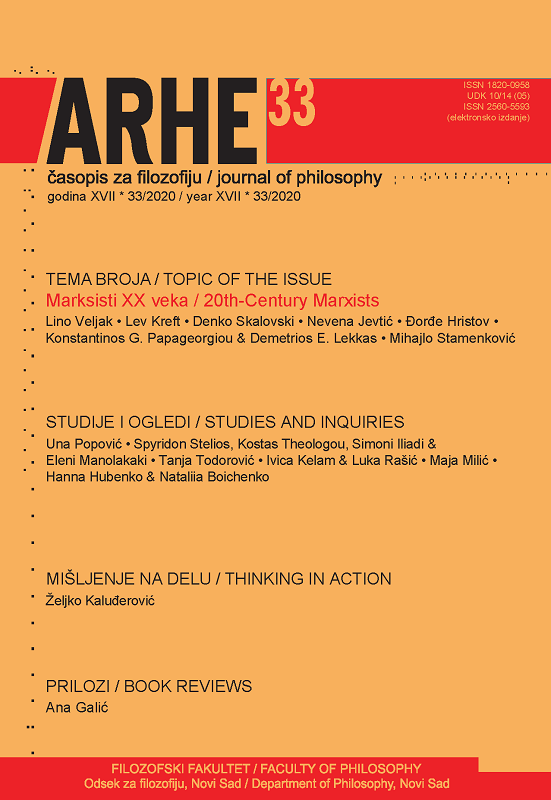THE INFLUENCE OF SCHOPENHAUER’S AND NIETZSCHE’S PHILOSOPHICAL THOUGHTS ON THE PHILOSOPHY OF EDUCATION AND EDUCATIONAL PESSIMISM
Main Article Content
Abstract
This paper gives a particular overview of reflections on education by two renowned philosophers of West European culture, Arthur Schopenhauer and Friedrich Nietzsche. What links their philosophy of education is the inclination towards the more complete shaping of a man. Nietzsche is a great supporter of Schopenhauer's understanding of philosophy as a philosophy of life. However, while Schopenhauer remained imprisoned in the world of pessimism, Nietzsche overcame the pessimistic view of the world with the image of a creative artist who consistently sets his life in motion, while enjoying his art of living. The thing they have in common is extreme individualism – the understanding of philosophy as the liberation of inner life. Arthur Schopenhauer perceived a man as a being of will that succumbs to laws of nature and the lower levels of humanity – will and passion. Friedrich Nietzsche saw a man as a being of will for power, emphasizing the power of the urgent and irrational one. Schopenhauer gave the pessimistic view of a man who is under the power of an unquenchable lust for life, whereas Nietzsche gave a nihilistic view of the world, in which he advocated demolishing and putting an end to the old values. In Nietzsche's opinion, a nihilist is someone who sees everything as pointless and futile. Arthur Schopenhauer had a significant influence, not only on Friedrich Nietzsche but also on some other great men of his time, who mostly did not support his philosophy in its entirety. Understanding the world in Schopenhauer's way came to life at the end of the 19th century and later, primarily because of Friedrich Nietzsche. This was an era in which social sciences finally began to develop separately, but at the same time complement each other. Due to this interaction, it was possible for Schopenhauer, and through him also for Nietzsche, to have such a significant influence on the European spiritual life.
Article Details
References
Bezić, Živan, „Isplati li se odgajati?“, Obnovljeni život: časopis za filozofiju i religijske znanosti, vol. 30, no. 6, 1975., pp. 553-560.
Bezić, Živan, „Je li odgoj potreban?“, Crkva u svijetu: teološki časopis, vol. 23, no. 1, 1988., pp. 17-25.
Frelih, Jasenka, „Utjecaj Arthura Schopenhauera na književnost i umjetnost“, Nova prisutnost: časopis za intelektualna i duhovna pitanja, vol. XI, no. 1, 2013., pp. 57-72.
Golubović, Aleksandra, „Filozofija odgoja“, Riječki teološki časopis, vol. 36, no. 2, 2010., pp. 609-624.
Kelam, Ivica; Segedin Vučić Jasminka, „The Applicability of the Socrates Method of Education in Education Today“, Pannoniana, vol. 3, no. 1-2, 2019.
Kopić, Mario, Etičar milosrđa, https://pescanik.net/eticar-milosrda/
Nietzsche, Friedrich, Untimely Meditations, Cambridge University Press, Cambridge 1997.
Resić, Idris, »Moć i granice odgoja«, http://majkaidijete.ba/savjeti/ pedagogija/item/2442-moc-i-granice-odgoja,
Schopenhauer, Arthur, Sämtliche Werke, Paul Deussen (ed.), München 1911.
Schopenhauer, Arthur, The world as a will and representation, The Falcon's Wing Press, Indian Hills 1958.
Sunajko, Goran, „Genij nasuprot talentu – umjetnost nasuprot estetici: bit Schopenhauerove estetike“, Studia lexicographica: časopis za leksikografiju i enciklopedistiku, vol. 11, no. 21, 2017., pp. 61-74.
Udruga za promicanje filozofije Filozofija.org, »Arthur Schopenhauer (1788. – 1860.)«, https://www.filozofija.org/wpcontent/uploads/Povijest_fil.org/suvremena_1_pdf/Schopenhauer-final.pdf.
